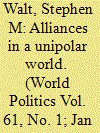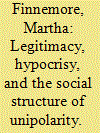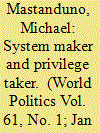| Srl | Item |
| 1 |
ID:
085932


|
|
|
|
|
| Publication |
2009.
|
| Summary/Abstract |
An alliance (or alignment) is a formal (or informal) commitment for security cooperation between two or more states, intended to augment each member's power, security, and/or influence.
|
|
|
|
|
|
|
|
|
|
|
|
|
|
|
|
| 2 |
ID:
085934


|
|
|
|
|
| Publication |
2009.
|
| Summary/Abstract |
Why did America invade Iraq? The glib answer is "because it could." In the unipolar moment the immediate costs and risks
of using military force against Saddam Hussein's hollow, troublesome regime seemed low to U.S. leaders.
|
|
|
|
|
|
|
|
|
|
|
|
|
|
|
|
| 3 |
ID:
085927


|
|
|
|
|
| Publication |
2009.
|
| Summary/Abstract |
One would think that unipoles have it made.After all, unipolarity is a condition of minimal constraint.Unipoles should be able to do pretty much what they want in the world since, by definition, no other state has the power to stop them.
|
|
|
|
|
|
|
|
|
|
|
|
|
|
|
|
| 4 |
ID:
085933


|
|
|
|
|
| Publication |
2009.
|
| Summary/Abstract |
International relations theorists were slow to recognize that America's unipolar moment had the potential to become an enduring feature of global politics.
|
|
|
|
|
|
|
|
|
|
|
|
|
|
|
|
| 5 |
ID:
085935


|
|
|
|
|
| Publication |
2009.
|
| Summary/Abstract |
To say that the world is now unipolar is neither to praise American power, let alone its leadership, nor to accuse the United States of having established a worldwide empire. It is to state a fact, but one whose meaning is far from clear, as we have neither a powerful theory nor much evidence about how unipolar systems operate.
|
|
|
|
|
|
|
|
|
|
|
|
|
|
|
|
| 6 |
ID:
085924


|
|
|
|
|
| Publication |
2009.
|
| Summary/Abstract |
American primacy in the global disrtribution of capabilities is one of the most salient features of the contemporary international system.The end of the cold war did not return the world to multipolarity.Instead the United States-already materially preeminent-became more so.
|
|
|
|
|
|
|
|
|
|
|
|
|
|
|
|
| 7 |
ID:
085925


|
|
|
|
|
| Publication |
2009.
|
| Summary/Abstract |
Does unipolarity promote peace among major powers? Would the return of multipolarity increase the prospects for war? Although unipolarity has been marked by very low levels of militarized competition among major power, many scholars doubt whether the association is causal.
|
|
|
|
|
|
|
|
|
|
|
|
|
|
|
|